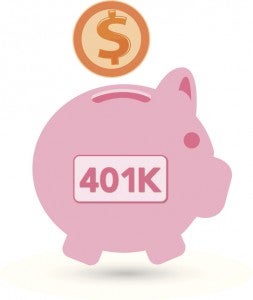Cashing out all or a portion of your 401K might seem like a good idea if you’re in debt or in need of a quick cash infusion, but it can be very costly because of tax penalties. Here are some of the rules to keep in mind if you’re considering withdrawing money from your 401K.
401K Hardship Withdrawals

The Internal Revenue Service may put a 10% early withdrawal penalty on any amounts you remove before age 59 ½. There are certain circumstances, however, in which you can take what is referred to as a hardship distribution, as long as your employer allows it. Some of the expenses that can be covered using a hardship distribution include:
- Tuition, including room and board, for yourself, your spouse, dependents and certain beneficiaries
- Medical expenses for yourself, your spouse or dependents
- Purchase costs for your principal residence, not including mortgage payments
- Costs related to avoiding foreclosure on or eviction from your principal residence
- Repair costs for damages to your principal residence
- Funeral expenses for deceased parents, spouse or dependents
Keep in mind that you’ll still need to pay taxes on any amounts you withdraw as a hardship distribution, so you’ll want to consider talking to an accountant or financial professional about whether this is a good option for you and your family. You can start your research by talking to your employer’s human resources department.
Other Penalty-Free 401K Withdrawals
Other situations that can qualify for early, penalty-free withdrawals include:
- Qualifying disabilities
- Court orders requiring that funds be given to your former spouse or a dependent
- Disasters that have been granted relief by the IRS
Again, however, state and federal taxes are still effective for any amounts withdrawn.
Alternatives to Early 401K Withdrawals
If you have a non-qualifying hardship, such as significant credit card debt that you can’t see a way to pay off, you can consider other options like credit card debt consolidation. You can also consider a home equity line of credit (HELOC) if you own your own home. This option allows you to borrow against whatever equity you might have in your home. With both options, you’ll avoid the 10% penalty and will keep your 401K investments working for you.
401K Loans
Another option is taking a loan against your 401K, but most financial experts advise against doing so unless you’ve exhausted all other alternatives. By taking out the loan, you’re removing money from your investments and negating all the good work you’ve already done toward saving for retirement.
If you’ve looked at every other possible option, a 401K loan can at least give you a lower interest rate than other loan options, but the difference will likely not make up for the hit to your retirement savings. Another positive of a 401K loan is that the repayments are automatically deducted from your paycheck. But, should you leave your job, you’ll likely be required to repay the loan balance within 60 days. And that loan now qualifies as an early withdrawal, so you’ll get hit with that 10% penalty, plus income taxes.
401K Withdrawals After Age 59 ½
Once you reach age 59 ½, you may begin withdrawing funds from your 401K without penalty. You can choose a lump-sum distribution or periodic distributions based on your personal needs. It’s a good idea to talk to your financial planner to decide what option is best for you, but keep in mind you’ll pay income taxes on lump-sum distributions right away. You can, however, just leave your retirement funds where they are until you reach age 70½, when the IRS requires that you begin taking distributions.
Constance is an editor and writer at Credit.com. Prior to joining us, she worked as an editor for MSN.com, senior digital producer for CNBC, and digital producer for NBC Nightly News.
She also is a graduate of the International Culinary Center in New York, has worked for chefs such as April Bloomfield and Jean Georges Vongerichten, and is the founder of Crave Personal Chef Services in Austin, Texas.






